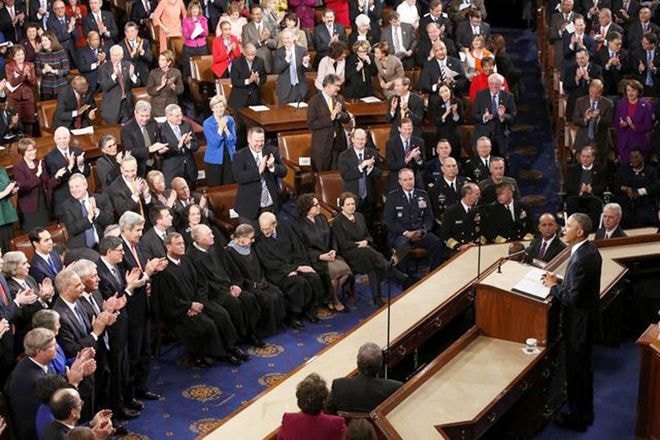America and the last two years of the presidential term: The long road will tell if a horse is good?
(Baonghean.vn) - The Democratic Party's defeat in the midterm elections in November 2014 was predicted to open a difficult period for President Barack Obama's administration. With pressure from the Senate and House of Representatives in the hands of the Republicans, will Obama have to abandon his reform policies? His latest speech on Tuesday, January 20th, seemed to indicate the opposite.
Throughout the presidential speech on the situation of the United States of America, there were extremely positive views about a new cycle opening up for the American economy. Officially out of the crisis, the American economy is said to be "on the rise, the budget deficit is reduced, a dynamic industry and energy production activities continue to be boosted". Perhaps that is the reason why the Democratic President's approval rating is increasing significantly, making the Republicans wary of a reversal that could be disadvantageous for them in the 2016 presidential election campaign.
In this favorable socio-economic context, President Obama affirmed that “Tonight, we turn a new page” - as a declaration that it is time for America to change, to rectify the current situation of disparity and inequality in society. Specifically, the reform policies he mentioned in this speech include: simplifying property ownership procedures; increasing the minimum wage; adjusting the leave mechanism for women giving birth and people with illnesses; conditionally exempting community colleges; adjusting tax rates, increasing taxes on the group that holds the majority of the wealth and money of the US economy in their hands and accounts for less than 1% of the population.
 |
| President Obama speaks before Congress on January 20. |
In particular, “middle-class economics” was considered the central thesis of the speech. President Obama affirmed - as he had previously stated during his 2-week visit to 12 states - that the middle class was the group most severely affected by the economic recession, and at the same time was the key to renewing America after 13 years of war and instability. “This country would be better if everyone got what they deserved and played by the same rules”, thus, social equality has been and still is one of the top concerns and ideals that President Obama has pursued since the beginning of his term.
Not only the gap between social classes, gender inequality is also a reality that he strongly condemns, at the same time he also believes that it is time to move towards a more humane America by improving social security mechanisms, ensuring workers' rights. Currently, up to 43 million American workers do not have the right to take sick leave and America is also "the only developed country in the world where this situation continues". It is not a new policy, but perhaps never before has the US President's determination been so high, he declared in a somewhat threatening tone: "We cannot accept risks to the safety of families by cutting off their health insurance. The same goes for issues related to new regulations on Wall Street or immigration. If any legislation is sent to my office that is related to these topics, I will use my supreme veto power".
It seems that President Obama has found a way to pursue his policies and prevent the last two years of his presidency from becoming a "nightmare" of frozen power. In return, perhaps the Senate and the House of Representatives, or more accurately, the new Republicans, are having to falter before the President's decisiveness on issues such as Iran's nuclear weapons or responding to global climate change. Bluntly rejecting the Senate's plan to increase sanctions against Iran, he said: "There is no guarantee that the negotiations will lead to a positive result, but increasing sanctions at this time is the surest guarantee that the negotiation process will fail." As for the opinion that global warming is a scientific issue and not the domain of politicians, President Obama replied: "I am not a scientist either. But the best scientists in the world say that our actions are the biggest factor affecting climate change."
This is not the first time the US President has threatened Republicans with the ultimate weapon - the veto. He has used this solution to pursue his policies on issues such as Iran's nuclear program or the Keystone XL pipeline project. The Democratic President's warning has been repeated over the past several weeks and was emphasized once again on Tuesday night.
This is not meaningless when the US is facing many problems of global scope and needs a strong change in policy to solve them thoroughly and as soon as possible. That is the Middle East region - the increasingly spreading storm of extremist jihad led by terrorist armed groups. That is the new cold war with the "bear" Russia, directly affecting the North Atlantic alliance led by the US. That is the relationship that is beginning to "thaw" with Cuba, or the steps to approach the economic and political security hotspots of the third world such as China, North Korea, Southeast Asia, ... The "fallen horse" of the semi-term election is proving to opponents and the world that "the long road will tell the good horse". But it remains to be seen how the US Congress will react, because it is not without reason that the semi-term election is considered an important milestone for US politics. The balance of power always has a counterweight to reach a state of stability - whether it is a peaceful stability or a stalemate due to an "inconclusive" argument.
Thuc Anh(According to Le monde)






